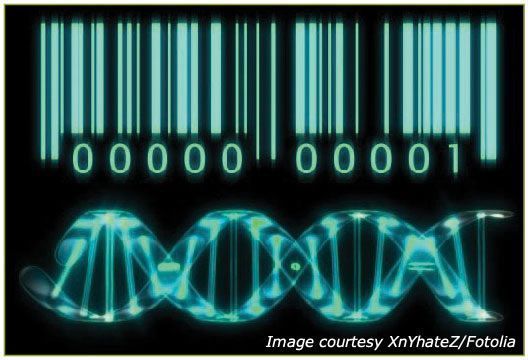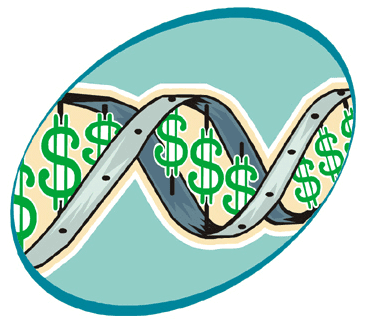The FDA’s recent regulatory action against popular genomic testing company, 23andMe, is generating mixed responses among integrative clinicians.
 Late in November, the FDA issued a widely publicized warning letter calling 23andMe’s test an unapproved diagnostic device, and ordering the company to discontinue its Personal Genome Service (PGS), an injunction 23andMe quickly obeyed. FDA holds that available data are insufficient to support the company’s gene-based health risk assessments.
Late in November, the FDA issued a widely publicized warning letter calling 23andMe’s test an unapproved diagnostic device, and ordering the company to discontinue its Personal Genome Service (PGS), an injunction 23andMe quickly obeyed. FDA holds that available data are insufficient to support the company’s gene-based health risk assessments.
23andMe will continue offering basic DNA data, but can no longer provide it’s popular health risk interpretations—explanations in lay terms focused on 254 common disorders, carrier status for known genetic diseases, and likely responses to common drugs.
Clinicians, who often find themselves at the crossroad of emerging technology, patient empowerment, and public safety, share regulators’ questions about the validity of the tests and the concern that without guidance people could misuse genetic information. Some are also concerned that companies like 23andMe will use or sell the data in ways their patients do not really understand.
On the other hand, some see the FDA’s move as a step toward restricting personal freedom and individual empowerment.
“I have not used 23andMe, but I think people should have the right to know whatever they want about themselves,” says Edward “Lev” Linkner, MD, a holistic family physician in Ann Arbor, MI. “As long as people are aware of the “data mining” aspect, why would FDA care? Using their personal data, maybe folks would make corrective lifestyle changes to prevent or modify their risks.So I say, ‘FDA, stay out of my genes!’”
Bungled Communication
Others, like Michael Traub, ND, a naturopathic physician in Kailua Kona, Hawaii, are more cautious.
“I think the public should have access to testing but with guidance from medical professionals.” He added that, “Regardless of the value of the product and the mission, it’s clear from the FDA report that 23andMe really bungled its relationship with FDA. There are lots of questions about why the company, after working closely with FDA since 2009 to get medical device approval, failed to respond over the last 6 months, and instead pursued a multi-million dollar advertising campaign.”
According to FDA spokeswoman Susan Laine, regulators consider the 23andMe Saliva Collection Kit and Personal Genome Service (PGS) as a medical device, based on its intended uses: the test package provides assessments for the BRCA-related genetic risk and drug responses (e.g. warfarin sensitivity, clopidogrel response, and 5-flurouracil toxicity), which puts it in the realm of diagnostic devices.
“FDA has serious concerns about the potential health consequences that could result from false positive or false negative assessments for high-risk indications such as these.”
She stressed that FDA is not singling out 23andMe. “FDA has been working with many other direct-to-consumer genetic testing companies, to be sure that those selling medical devices are moving toward appropriate regulatory compliance. The agency uses the same evidentiary bar for all companies that make similar claims.”
One week after the FDA’s warning letter, 23andMe’s troubles were compounded by a class action lawsuit to the tune of $5 million, citing fraud and deception, and filed on behalf of Lisa Casey, a San Diego woman who claims that PGS results are “meaningless,” and that 23andMe “falsely and misleadingly” promotes its tests.
The complaint was filed by Mark Ankcorn, a well-well known San Diego class action attorney.
In addition to challenging the truthfulness of the tests, the complaint underscores the fact that 23andMe is amassing customers’ DNA information with the long-term goal of marketing data to researchers. “It seems to me to be a very thinly disguised way of getting people to pay them to build a DNA database,” said Mr. Ankcorn in an interview with Associated Press.
Double Helix Meets Dollar Signs
With its huggable name, $99 saliva test kits, colorful commercials (“It’s like a self-portrait”), and sophisticated yet simple redux of genome science, 23andMe did for genetics what AOL did for the internet two decades ago: took advanced technology out of its specialist silo and into the nation’s living room.
 The company—whose major investors include Google and Genentech, and whose co-founder, Ann Wojcicki is the soon-to-be ex-wife of Google founder, Sergei Brin–made genetics sound like fun. The core message seemed to be, “We’re all unique, yet we’re all a big human family, and together we can help each other get healthier.”
The company—whose major investors include Google and Genentech, and whose co-founder, Ann Wojcicki is the soon-to-be ex-wife of Google founder, Sergei Brin–made genetics sound like fun. The core message seemed to be, “We’re all unique, yet we’re all a big human family, and together we can help each other get healthier.”
In an age when healthcare issues trigger intense rancor, 23andMe struck a deeply populist chord that resonated with many. By the time of FDA’s cease-and-desist, the company had amassed DNA from over 400,000 individuals.
23andMe began marketing in 2008, and its test kit was named “Invention of the Year” by TIME magazine. Initially priced at $395, it generated considerable buzz, but public embrace only grew when the price dropped to $99.
From the get-go, 23andMe was a darling of Silicon Valley. It launched with seed money from Google, Genentech, New Enterprise Associates, and Mohr Davidow Ventures, with Google’s portion alone tallying $3.9 million. In 2012, the company raised another $50 million, to augment its existing capital of $52.6 million.
While revenue from nearly half a million people paying $99 or more was significant, the company’s future growth was predicated on mining its DNA library. Company spokespeople often told funders that 23andMe’s near-term goal was to reach one million customers.
In an interview with Bloomberg News, just weeks before the FDA’s action, Ms. Wojcicki said, “We will hit a million people, probably within first quarter of next year. And I think with a million people, you start to really become disruptive. One, you have so much data—by far and away the largest data set, and two, you have all these people running around town asking their physicians and telling their friends and family about their genome. With a million people, you start to get into meaningful Big Data.”
A Landmark Case
There are many yet-to-be answered questions, including whether 23andMe will step up and meet FDA’s demand for more validation, and if so, whether the agency will greenlight reintroduction of the PGS tests.
agency will greenlight reintroduction of the PGS tests.
FDA’s Susan Laine says that, “Although we cannot speculate on any outcomes, we certainly hope we can work with 23andMe to get tests to market that have demonstrated validity.”
But beneath that surface layer lie deeper questions about the validity of making disease risk determinations based on analysis of single nucleotide polymorphisms (SNPs), the basis most consumer-facing genome tests, including 23andMe’s.
In a recent New York Times article, Kira Peikoff, a healthy 28-year-old reporter chronicled her experience of getting her genome read by three different testing companies, inclyding 23andMe. The three reports showed marked discrepancies on a number of key disease risk assessments including rheumatoid arthritis and psoriasis.
Peikoff’s article underscores the divergent methodologies used by commercial genome testing companies, and the lack of consensus on how to translate SNP data into meaningful risk prediction.
FDA’s warning letter, issued by Alberto Gutierrez, Director of the Office of In Vitro Diagnostics and Radiological Health, takes 23andMe to task for, essentially, ignoring requests for more data. Citing several years of dialog and “more than 14 face-to-face and teleconference meetings, hundreds of email exchanges, and dozens of written communications,” Gutierrez says 23andMe failed to provide analytical validation and statistical support for its health risk interpretations.
The communication breakdown has triggered much speculation in the health and business blogospheres. Some observers believe it reflects an “above the law” mentality among 23andMe’s executives; others question whether the company really has the science to support its tests. Still others suggest that unexpected changes in the company’s legal department resulted in the non-response.
23andMe is standing by the validity of its tests. In a recent blog, Anne Wojcicki noted that, “We have worked extensively with our lab partner to make sure that the results we return are accurate,” and added that, “We stand behind the data that we return to customers – but we recognize that the FDA needs to be convinced of the quality of our data as well.”
In a statement on the company’s website, she states that, “Our goal is to work cooperatively with the FDA …in a way that clearly demonstrates the benefit to people and the validity of the science that underlies the test.”
Many observers see the 23andMe case as a landmark with far-reaching implications. Beyond the specifics of 23andMe, FDA’s letter includes language that seems to challenge the very notion of direct-to-consumer genomics.
“Some of the uses for which PGS is intended are particularly concerning, such as assessments for BRCA-related genetic risk and drug responses (e.g., warfarin sensitivity, clopidogrel response, and 5-fluorouracil toxicity) because of the potential health consequences that could result from false positive or false negative assessments,” the warning letter states.
In short, FDA is worried that some people might seek unwarranted prophylactic surgeries based on genomic signals of cancer risk, or that others might discontinue medications or change doses on their own, without practitioner guidance, based on what their 23andMe results tell them.
Empowerment or Recklessness?
Self-management seems to be one of FDA’s biggest issues in this case. The concerns echo similar contentions that followed other disruptive medical technologies like home pregnancy testing when it was first introduced in the mid-1970s, or home HIV testing in the 1990s.
The FDA’s stated concern that women will get prophylactic mastectomies based on erroneous 23andMe results—the so-called “Angelina effect”– seems like a straw woman. As some health freedom advocates quickly pointed out, in order to get such a procedure, a woman would have to go through multiple physician consultations. Presumably, a rash move would be buffeted by good medical reasoning.
The notion that people will modulate their drug therapies based on gene findings is harder to dismiss.
Empowered and individualized self-management is one of the core tenets of holistic and functional medicine, and it is the cornerstone of the “personalized medicine” movement. Yet, medical organizations representing functional and personalized medicine have been very quiet about the 23andMe case.
A spokeswoman for the Institute for Functional Medicine told Holistic Primary Care that the group’s leadership, “doesn’t want to offer an opinion until the issue with the FDA is resolved. But we all agree that this is a hot topic and one that IFM will want to weigh in on in the near future.”
The Personalized Lifestyle Medicine Institute (PLMI)—which has been active in promoting the concept of mitigating genetic risk through lifestyle change—has been similarly cautious in commenting, though the group’s founder and philosophical guiding light, Jeffrey Bland, PhD, voiced general support for genomic testing in a video posted on the group’s website.
Who Owns the Book of Life?
“The most important asset we own is the information encoded in our DNA, the 23 chapters of our Book of Life. Our chromosomes, our genomes. It’s very intimate. It’s the River of Life that’s confluent down to us. It doesn’t tell us how we’re going to die, it doesn’t tell us how we’re sick. Its going to tell us how we live, its going to tell us how to adjust our lifiestyle, environment, principles of living so that we can maximize our life experience and our function,” said Dr. Bland.
“This concept of a negative view of this information, that its all about disease risk, about how we will get sick is totally off-center. It’s really information that alerts the person as to how they should design their lifestyle to live optimally healthy. It’s a functional component, not a dysfunctional component.”
While acknowledging that there are many urgent questions about ownership of genomic information, the validity of testing methods, personal responsibility, and meaningful regulation, Dr. Bland views the current controversy as a reflection of the nation’s “death and disease-centered culture.”
“Everybody’s concerned about what might be the implications on disease management, not the implications of health management.”
Given that only 30% of chronic diseases have a direct genetic linkage, there’s tremendous opportunity to influence the factors that regulate gene expression. “Wouldn’t you want to know how to modify that environment to create an outcome called health rather than disease?”
The timing of FDA’s action against 23andMe is interesting. The technology behind gene sequencing and analysis has evolved rapidly, as has investor interest in the field. 23andMe is simply the most visible company marketing genome tests to the public; it is definitely not the only one.
David & Goliath? Not Quite!
Commentators with a libertarian bent see in this case the strangling hand of “the government” attempting to kill off innovation and stifle individual liberty. Others argue that the FDA is acting in the interests of big insurance and pharmaceutical corporations desiring to protect their disease-based revenues and/or gain control over the world’s largest gene library, possibly with an eye toward using genome data to stratify insurance risk.
 Those who smell a corporate conspiracy point to a March 2012 report by UnitedHealth Group—the nation’s largest publicly traded health insurer—that questioned the accuracy and affordability of consumer-facing genetic tests. UHG estimated that gene testing was already a $5 billion dollar business, and could become a $25 billion industry by decade’s end.
Those who smell a corporate conspiracy point to a March 2012 report by UnitedHealth Group—the nation’s largest publicly traded health insurer—that questioned the accuracy and affordability of consumer-facing genetic tests. UHG estimated that gene testing was already a $5 billion dollar business, and could become a $25 billion industry by decade’s end.
The report, which suggested the need for increased regulation, has been widely cited in online stories about the 23andMe case, most notably on the Bloomberg website. HPC has not been able to obtain an actual copy of the UnitedHealth report; a PDF was previously available on the insurer’s site but is no longer posted.
A number of 23andMe’s supporters portray the company as an innovative and well-meaning “David” being stomped down by a “Goliath” representing a hopelessly old-fashioned and paternalistic medical establishment.
It’s an appealing narrative, except that with a $100 million war chest, the world’s biggest internet company in its corner, and a massive cache of highly marketable data already in it’s possession, 23andMe is hardly an underdog. Further, the company has not explained why it did not respond to the regulators’ repeated requests for validation data.
Nor is the FDA necessarily a backward-facing dinosaur bent on squelching innovation. Just weeks after its injunction against 23andMe, the agency announced marketing authorization of Illumina’s MiSeqDx, the world’s first high-throughput genomic sequencer, that will enable faster and cheaper DNA analysis, and ultimately enable clinicians to identify nearly unlimited numbers of genetic changes that may have medical significance.
MiSeqDx is the child of a decade’s worth of coordinated public and private-sector research. In an editorial published on December 19 in the New England Journal of Medicine, FDA Commissioner Margaret Hamburg and Francis Collins, Director of the National Institutes of Health praised it as “rare example of technology development in which faster, cheaper, and better have coincided.”
Genome-Guided Nutrition
The genomics revolution, and the current controversy over it, has not gone unnoticed in the natural products industry.
A number of supplement companies have been working with genetic testing companies to develop protocols for genomically-guided nutritional interventions that would bring a rational and individualized approach to the use of supplements, says Loren Israelsen, founder of the United Natural Products Alliance.
In an interview with Holistic Primary Care, Mr. Israelsen said he is following the 23andMe story closely, in part out of direct personal interest in the subject.
“My sense is that people who want to know about their genetics really have a passion for this. They want ALL the details.” Counting himself among the early adopters, he said that his organization made 23andMe test kits available to attendees at a recent industry gathering focused on nutrigenomics and personalized medicine, and held one month before FDA’s action.
“A number of people couldn’t get into those boxes fast enough. Others were really unsure. Still others did not want to know–they gave the kits away to someone else.”
He believes that some data provided by companies like 23andMe make sense for everyone to know, including the capacity to metabolize common drugs, and inter-ethnic metabolic differences and predispositions for various disorders. Knowing these things can lead to better decision-making and improved self-care.
That said, he acknowledged that, “in the wrong hands, ill can come from this.”
In the rush to commercialization, there’s plenty of incentive for testing companies as well as the supplement and drug makers to over-promise, under-deliver and wittingly or unwittingly misguide consumers.
The situation, says Mr. Israelsen, cries out for well-qualified clinicians who are able to understand the significance of genome-based tests, interpret them for lay people, and serve as guides for intelligent, informed decision-making.
He believes this opens ideal opportunities for holistically-minded practitioners to step forward and fill a currently unmet need.
People want doctors that can help them make sense of a bewildering world in which predictive genomics—little more than a pipe-dream 60 years ago, when Watson & Crick described the structure of DNA—has become an inexpensive and widely accessible reality.
END







